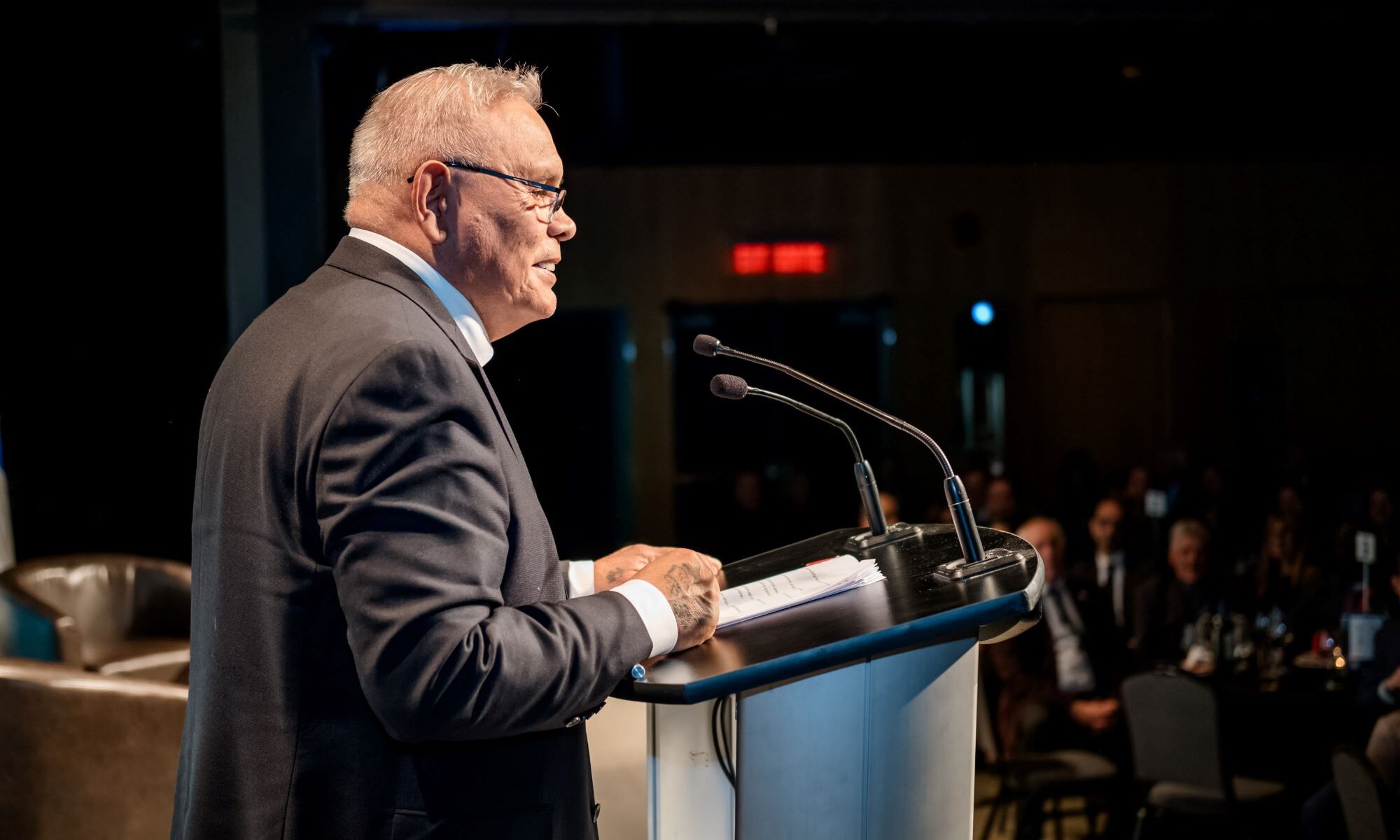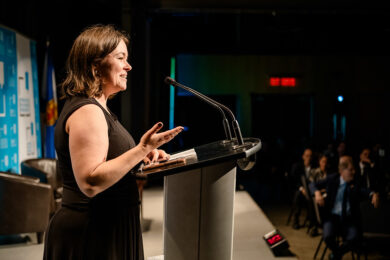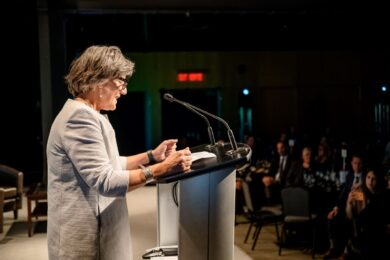
Chief Mi’sel Joe: ‘You don’t always get what you want by pounding on someone’s desk’

Chief Mi’sel Joe received the 2024 Frank McKenna Award at a ceremony at Pier 21 in Halifax. During his three decades as chief of the Miawpukek First Nation in Newfoundland, Chief Joe negotiated with government, industry and business partners to help build a thriving community. In his acceptance speech, he talks about what it took to get to where the community is today — and the many lessons he learned along the way.
My real education began here in Halifax 60 years ago. I landed here scared out of my mind, broke. I didn’t know where my next meal was going to come from. But I had a cousin that worked out of here on a fishing boat. I said to myself, if I can find him, I may have a chance at some kind of survival. I went down every morning, waiting for a fishing boat to come in. And one morning, standing on the bow of a fishing boat, was my cousin. That was my survival. In a way, that was part of my governance style. I always believed that you shouldn’t let a lack of money ever keep you from where you want to go. Always rely on family and the expertise of others. That’s the only way that we can survive. Sometimes we have to swallow that pride and ask for what we need.
I spent years working across the country in many different types of jobs, hoping I could gain some experience to bring back to my community — and I did. If you looked at my resume, it would have looked like I couldn’t keep a job. But that’s not true. Every job I had took me closer to my goal: to finally come home and work in my own community. In April of 1974, I came back to Conne River for good, to help build the community where we are today. In 1983, after the death of my uncle in 1982, I very foolishly put up my hand to accept the nomination for chief, not knowing what I was getting into, not knowing where we were going to go. My first responsibility as chief of my community at the time was to take on the provincial government for withholding $800,000 of our community funds for 13 months. Even my own family and friends in the community said, “You’re crazy, you’re never going to get what the province is holding because your uncle couldn’t even do it.” I’ve learned that if you don’t try, you don’t get.
After many, many discussions, we were finally told no. So we decided that we would go to St. John’s and put a padlock on the minister’s door. We were hauled off to court the next day. We were fined for mischief, told to go home and be good Indians. We chose not to go home. We went a hunger strike for nine days. We had negotiators on the outside who finally convinced Premier Peckford to release our funds. Through that protest, I realized that you don’t always get what you want by pounding on someone’s desk. You have to use respect and common sense. If you talk nicely to people, they don’t always listen, but you get a chance to go back and talk some more. Having good people around to help point you in the right direction always helps and I’ve had that.
Part of the fight for us was to take away education from the church in 1985. They outlawed our language and culture. In 1985, we said to the church, ‘You’re not doing this any longer. We’re taking away education for ourselves. We’re going to do it ourselves.’ The chairman of the schoolboard at the time said to me, ‘If you’re lucky enough to get your hands on education dollars, what are you going to do with it? Are you going to buy cigarettes and beer? You know absolutely nothing about education.’ The only response I could think of under pressure was, ‘We can’t do any worse than you’ve done, father.’
I’d like to say it was smooth sailing after that fight with the province, but it wasn’t. My own people removed me from office in 1988 in a coup. After six years, things got pretty dire for me. I had no money, I had no job. There was no food in my house and our hydro was about to be cut. Then one day I came home to find someone had dropped off a welfare cheque for $120. My first thought was to get some food, pay some bills. Then I decided, ‘No.’ I had never been on welfare in my life. I put the $120 in an envelope, sent it back, and said ‘thanks, I don’t need it.’
That was the turning point for me. In 1994, I was elected as administrative chief with an overwhelming majority. Based on my earlier experience, I came to believe that no one should ever be on welfare if they are willing and able to work. We used social dollars allocated to us by the federal government to do what we called job creation. We used the money to help train our people and build our community. This was considered unacceptable at the time by the federal government, but we did it anyway. In doing so, we developed our own work force right in the community. We now have 100 percent employment, full-time and part-time, based on a system of using welfare to put people to work, to give them a sense of dignity and well-being.
Along the way, we had a turning point in our fiscal management. We made one bad investment using core funds. We invested in a fish farm and lost $3 million of our community funds. Of course, anyone that knows INAC, the first thing they wanted to do is send in managers to take over because you can’t do it right. I said, ‘No way. We got in trouble by ourselves, we need to find a way out by ourselves.’ And we did. We were able to pay it off after five years. We did it by laying everybody off, except essential workers, including myself. We learned never to use core funding for investments. We set up a finance law so it couldn’t ever be done again.
Miawpukek First Nation relies on government funding and our own source of revenues. It comes mostly from the sea which is very important to us. We own our own commercial fishing fleet operated by our own company in Newfoundland. We are part of the Mi’kmaq Coalition that acquired 50 percent ownership of Clearwater Seafood, which holds a fishing license for Arctic surf clams. We also own a large number of commercial fishing boats in Newfoundland, and we have partnered with companies such as fish plants and processors. In 2021, through a joint venture between Horizon Maritime and Miawpukek First Nation, we became 51 percent owners of the icebreaker formerly known as the Sir Humphrey Gilbert. We now call it the Polar Prince. We use the vessel for education and research expeditions, including Students on Ice. In early December, we had the first Indigenous-led expedition, where we brought Indigenous youth together with scientists, hoping to inspire our youth to look at careers in the seafaring industry. We are building our nation to be a strong community for the next seven generations to come and beyond.
Before my retirement as administrative chief in January 2024, I spent 50 years fighting to create something better than I had growing up. Before I left office earlier this year, I asked that we commission a report on the socioeconomic impacts of Miawpukek First Nation. Forty years of data showed the Miawpukek First Nation community development model as successfully providing a high-level of well-being to our people, including physical, mental, socioeconomic and environmental. But we don’t need a report to tell us that — we already know. The total economic output attributed to Miawpukek First Nation spending in 2023 was $132.5 million in Canada and $102.3 million in the province of Newfoundland. Miawpukek First Nation has had a major impact on the economy of Canada and Newfoundland. In 1983, we were fighting Newfoundland for $800,000. In 2023, Miawpukek First Nation made a contribution of $102.3 million to the province of Newfoundland’s economy.
I’m so proud to be here among all of you because you’re all very special people. But I want to tell you about some very special people of my own. The greatest of all is my wife of 56 years. My daughter, my great-granddaughter and two great-grandsons. To sum all this up, I want to say that I’ve learned from my parents, my community and my elders three short words that have been so powerful in my life: Never say never.
Wila’lioq. Thank you all.
This transcript has been edited for length and clarity.





